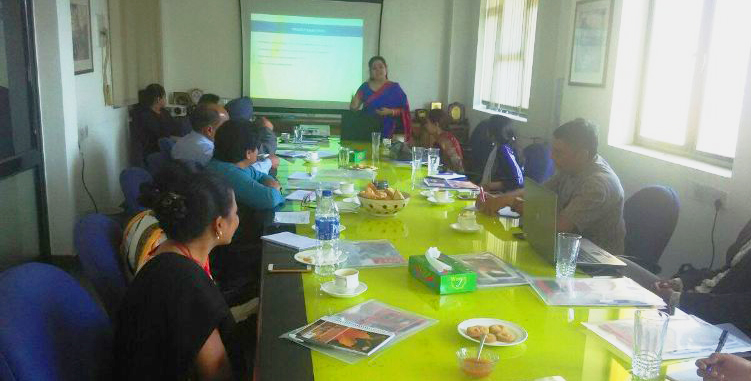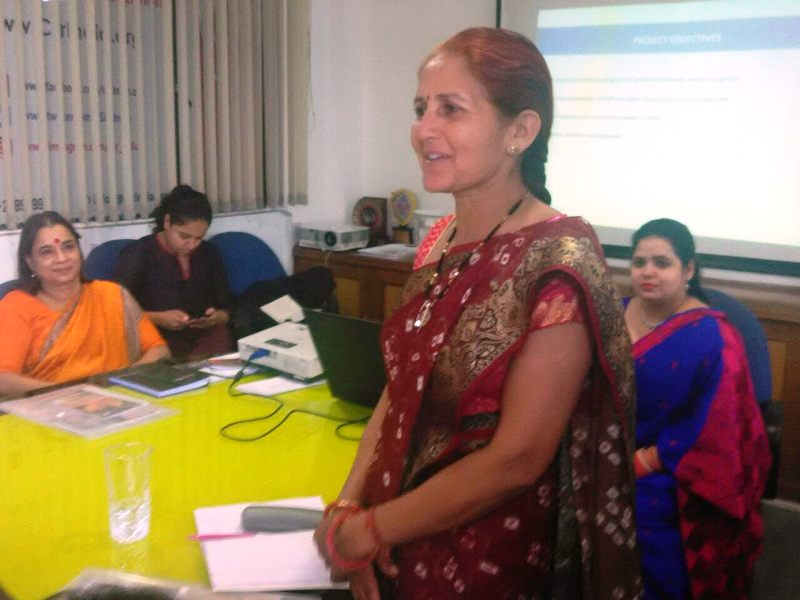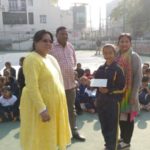The agenda of the meeting, held at headquarters of Centre for Social Research, was to share the experiences of the stakeholders for the HSS-CSR Climate Project 2017 and plan out the activities that are to be carried out for the year 2018.
The welcome note was provided Ms. Ritika Bhatia, where she recapitulated 2017. She talked about how the project had wide reach by involving the target areas of Abu Road and Jaipur, and how the elected women representatives were very keen to be a part of scaling up activities. The key takeaways for the year 2018 include intensifying bottom-up participation of these EWRs, conducting exposure visits with them, and giving them technical trainings. She also added that there is lack of concrete information on online web resources of Rajasthan government.


She went on to discuss the milestones achieved by this project. She shared that since last year, her team has observed that the attitude in villages towards water management is not the department of women, and they should keep away from this. So the aim should also be to change these attitudes. Another point of note is that many aanganwadi workers were involved in the process, and less EWRs. She went on to say that while everyone has demonstrated understanding of TDS kits, however, geohydrology is a complicated phenomenon to them, and it needs simplification
Mr. Sandeep Dubey, Program Manager, HSS India, shared how he came on board with this project in 2016 and since then, the project has evolved at three levels- community level, policy level and theory level. He talked about realizing that the next actionable goal for this project would be to equip EWRs with technical knowledge, to build their capacities as much as their male counterparts, so that their voices are heard and respected in Panchayats. He also pointed out that women and children constitute the most vulnerable group in matters of water scarcity, and therefore we need to strengthen the technical requirements of this group, so that they can sustain themselves in water conservation and budgeting. He went on to say that the feedback since 2017 has been positive, and the focus now is on geohydrology and water budgeting. Simultaneously, the aim of this project is also to amass key learnings and best practices of water conservation across India, and analyse its replicability. He stressed upon the importance of field visits, and how these are particularly important.


Ms Richa Audichiya, local expert from Rajasthan’s Jan Chetna Sanstha, talked about the need for ‘integrated planning’, as well as provided the suggestion of covering water audit and gender audit.
Dr. Jagveer Singh (Technical expert, GVNML, Jaipur) said that topography was widely discussed during trainings, thus making them very technical, and suggested that perhaps the technical understanding of water conservation can be integrated with the GPDP plan, thereby creating a block level resource group. He also talked about the need to have innovative learning techniques for EWRs.
Dr. Ranjana Kumari, Director, CSR, talked about the relevance and need for media advocacy and policy advocacy, by taking help of community radio. She also said that NITI Aayog can be approached for policy advocacy of this issue.


Ms. Arnika, CSR, suggested that research scholars and academia in general, should be formally involved in this project because they are updated on local understanding of issues. There should also be provision of skill-based training of these EWRs, as well as the need to liaise with government bodies, by way of holding national and state level conferences. Other civil society organizations should also be involved in this.
Ms. Suhasini , CSR, talked about how it is important to keep the EWRs motivated as they are the ones working on ground, and basically carrying the project on their shoulders.
Dr. H.S Bhatia, Water Expert, stated that first, state-level conferences should be organized, moving on to national level conferences. By doing this, we will be in a better position to know the problems of individual villages. It is important to see each village as separate, because their characteristics, problems and solutions will be different too. Therefore, both micro level and macro level approaches are important. It is important to network with Public Health Departments of each district is possible.
Mr. Suman (Project Coordinator, CEE) stated that their organization has mostly worked with the technical part of water conservation, and to integrate gender with it, was something he learnt from CSR. He talked about his organization’s projects related to water budgeting in Gujarat with school children and women, where water budgeting being taught as a ‘sanskaar’ to school children.
He talked about the importance of resource maps, to identify target areas, and how the student plays have helped in spreading the message. He also talked about the importance of a proper orientation class for people, regarding the MNREGA benefits.
Mrs Uma Sharma (Elected women representative) shared experiences of their struggle in implementation and execution. Kamla Sharma (local resource person) discussed about the skill development training for employability. Ranjana Devi(Elected women representative) appreciated the technical knowledge gained from the training of trainers and also the exposure visit in Laporiya village. Dr Soma Parthasarthy, provided suggestions to look into water conflict forum and also for grounded documentation and alliance building. Mr Volker Lennart Plän (resident representative) observed that practices should be inclusive, and participants willingness to do.
Ms Ritika Bhatia, Project Lead, had this to say “It was a very comprehensive meeting, and provided a clear guideline on the way forward for 2018. The key takeaway in my opinion is that it is important to upscale the program, for which networking with the government is required.”




